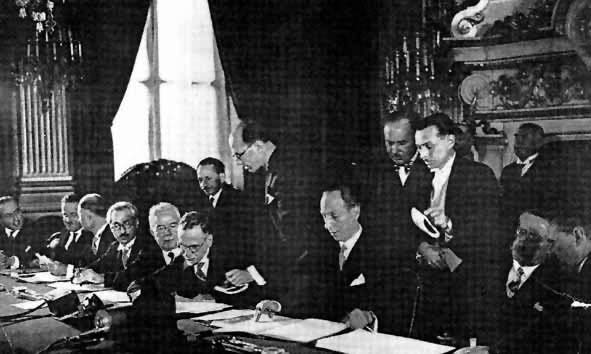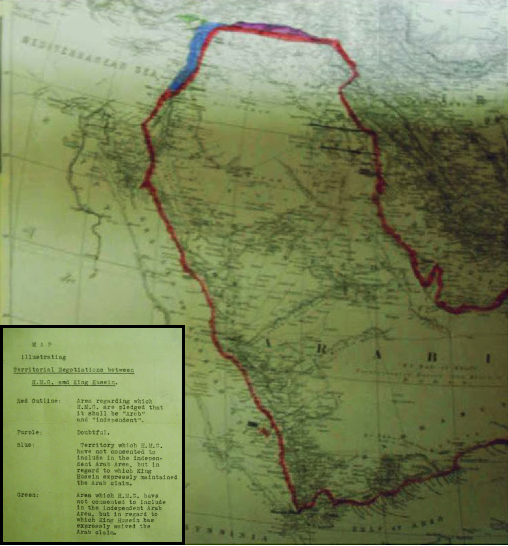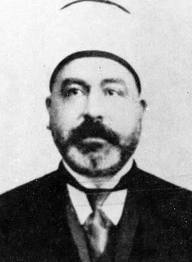|
Jamil Mardam Bey
Jamil Mardam Bey ( ota, جميل مردم بك; tr, Cemil Mardam Bey; 1895–1960), was a Syrian politician. He was born in Damascus to a prominent aristocratic family. He is a descendant of the Ottoman general, statesman and Grand Vizier Lala Mustafa Pasha and the penultimate Mamluk ruler Qansuh al Ghuri. He studied at the school of Political Science in Paris and it was there that his political career started. Early political life Al-Fatat was a secret society founded in response to the nationalist agenda of the Young Turks Revolution in 1908, that gave priority to Turks above other citizens of the Ottoman Empire. Jamil Mardam Bey along with a small group of other students in Paris joined al-Fatat in 1911. The society called on Arab and Turkish citizens to remain united within the Ottoman framework, but claimed that Arabs should have rights and obligations equal to their Turkish counterparts. Mardam Bey helped organise the Arab Congress of 1913 in Paris, bringing together ref ... [...More Info...] [...Related Items...] OR: [Wikipedia] [Google] [Baidu] |
Syrians
Syrians ( ar, سُورِيُّون, ''Sūriyyīn'') are an Eastern Mediterranean ethnic group indigenous to the Levant. They share common Levantine Semitic roots. The cultural and linguistic heritage of the Syrian people is a blend of both indigenous elements and the foreign cultures that have come to inhabit the region of Syria over the course of thousands of years. The mother tongue of most Syrians is Levantine Arabic, which came to replace the former mother tongue, Aramaic, following the Muslim conquest of the Levant in the 7th century. The conquest led to the establishment of the Caliphate under successive Arab dynasties, who, during the period of the later Abbasid Caliphate, promoted the use of the Arabic language. A minority of Syrians have retained Aramaic which is still spoken in its Eastern and Western dialects. In 2018, the Syrian Arab Republic had an estimated population of 19.5 million, which includes, aside from the aforementioned majority, ethnic minorities such as ... [...More Info...] [...Related Items...] OR: [Wikipedia] [Google] [Baidu] |
Syrian National Congress
The Syrian National Congress, also called the Pan-Syrian Congress and General Syrian Congress (GSC), was convened in May 1919 in Damascus, Syria, after the expulsion of the Ottomans from Syria. The mission of the Congress was to consider the future of "Syria", by which was meant Greater Syria: present-day Syria, Lebanon, Israel, Palestine, and Jordan. The Congress also intended to present Arab views to the American King-Crane Commission of inquiry. The Congress was considered the first national parliament in the modern history of Syria. The Congress was attended by representatives from all parts of Greater Syria, including Lebanon and Palestine, and was headed by Hashim al-Atassi. Some participants showed support for King Faisal's demands, while others were beginning to question his willingness to make concessions to pro-Zionist groups. In its final report it pleaded that "there be no separation of the southern part of Syria, known as Palestine, nor of the littoral western zo ... [...More Info...] [...Related Items...] OR: [Wikipedia] [Google] [Baidu] |
Paris Peace Conference (1919–1920)
The Paris Peace Conference was the formal meeting in 1919 and 1920 of the victorious Allies after the end of World War I to set the peace terms for the defeated Central Powers. Dominated by the leaders of Britain, France, the United States and Italy, it resulted in five treaties that rearranged the maps of Europe and parts of Asia, Africa and the Pacific Islands, and also imposed financial penalties. Germany and the other losing nations had no voice in the Conference's deliberations; this gave rise to political resentments that lasted for decades. The conference involved diplomats from 32 countries and nationalities. Its major decisions were the creation of the League of Nations and the five peace treaties with the defeated states; the awarding of German and Ottoman overseas possessions as " mandates", chiefly to Britain and France; the imposition of reparations upon Germany; and the drawing of new national boundaries, sometimes involving plebiscites, to reflect ethnic bounda ... [...More Info...] [...Related Items...] OR: [Wikipedia] [Google] [Baidu] |
Faisal I Of Iraq
Faisal I bin Al-Hussein bin Ali Al-Hashemi ( ar, فيصل الأول بن الحسين بن علي الهاشمي, ''Faysal el-Evvel bin al-Ḥusayn bin Alī el-Hâşimî''; 20 May 1885 – 8 September 1933) was King of the Arab Kingdom of Syria or Greater Syria in 1920, and was King of Iraq from 23 August 1921 until his death. He was the third son of Hussein bin Ali, the Grand Emir and Sharif of Mecca, who was proclaimed as King of the Arabs in June 1916. He was a 38th-generation direct descendant of Muhammad, as he belonged to the Hashemite family. Faisal fostered unity between Sunni and Shiite Muslims to encourage common loyalty and promote pan-Arabism in the goal of creating an Arab state that would include Iraq, Syria and the rest of the Fertile Crescent. While in power, Faisal tried to diversify his administration by including different ethnic and religious groups in offices. However, Faisal's attempt at pan-Arab nationalism possibly contributed to the isolation of ce ... [...More Info...] [...Related Items...] OR: [Wikipedia] [Google] [Baidu] |
Balfour Declaration
The Balfour Declaration was a public statement issued by the British government in 1917 during the First World War announcing its support for the establishment of a "national home for the Jewish people" in Palestine, then an Ottoman region with a small minority Jewish population. The declaration was contained in a letter dated 2November 1917 from the United Kingdom's Secretary of State for Foreign Affairs, Foreign Secretary Arthur Balfour to Walter Rothschild, 2nd Baron Rothschild, Lord Rothschild, a leader of the British Jews, British Jewish community, for transmission to the Zionist Federation of Great Britain and Ireland. The text of the declaration was published in the press on 9November 1917. Immediately following their declaration of war on the Ottoman Empire in November 1914, the British War Cabinet began to consider the future of Palestine; within two months The Future of Palestine, a memorandum was circulated to the Cabinet by a Zionist Cabinet member, Herbert Sam ... [...More Info...] [...Related Items...] OR: [Wikipedia] [Google] [Baidu] |
Izvestia
''Izvestia'' ( rus, Известия, p=ɪzˈvʲesʲtʲɪjə, "The News") is a daily broadsheet newspaper in Russia. Founded in 1917, it was a newspaper of record in the Soviet Union until the Soviet Union's dissolution in 1991, and describes itself now as a "national newspaper" of Russia. The word ''izvestiya'' in Russian means "bring news" or "tidings", "herald" (an official messenger bringing news), derived from the verb ''izveshchat'' ("to inform", "to notify"). Origin The newspaper began as the ''News of the Petrograd Soviet of Workers Deputies'' on in Petrograd. Initially, the paper expressed Menshevik and Socialist-Revolutionary Party views. In August 1917, it took the title ''News of the Central Executive Committee of the Petrograd Soviet of Workers' and Soldiers' Deputies''. By October 1917 it became ''News of the Central Executive Committee of the Soviets of Working and Military Deputies'', and was eventually re-titled ''News of the Soviets of People's Deputies'' ... [...More Info...] [...Related Items...] OR: [Wikipedia] [Google] [Baidu] |
Leon Trotsky
Lev Davidovich Bronstein. ( – 21 August 1940), better known as Leon Trotsky; uk, link= no, Лев Давидович Троцький; also transliterated ''Lyev'', ''Trotski'', ''Trotskij'', ''Trockij'' and ''Trotzky''. (), was a Russian Marxist revolutionary, political theorist and politician. Ideologically a Marxist, his developments to the ideology are called Trotskyism. Born to a wealthy Jewish family in Yanovka (now Bereslavka, Ukraine), Trotsky embraced Marxism after moving to Mykolaiv in 1896. In 1898, he was arrested for revolutionary activities and subsequently exiled to Siberia. He escaped from Siberia in 1902 and moved to London, where he befriended Vladimir Lenin. In 1903, he sided with Julius Martov's Mensheviks against Lenin's Bolsheviks during the Russian Social Democratic Labour Party's initial organisational split. Trotsky helped organize the failed Russian Revolution of 1905, after which he was again arrested and exiled to Siberia. He once again escape ... [...More Info...] [...Related Items...] OR: [Wikipedia] [Google] [Baidu] |
Sykes–Picot Agreement
The Sykes–Picot Agreement () was a 1916 secret treaty between the United Kingdom and France, with assent from the Russian Empire and the Kingdom of Italy, to define their mutually agreed Sphere of influence, spheres of influence and control in an eventual partition of the Ottoman Empire. The agreement was based on the premise that the Triple Entente would achieve success in defeating the Ottoman Empire during World War I and formed part of a series of secret agreements contemplating its partition. The primary negotiations leading to the agreement took place between 23 November 1915 and 3 January 1916, on which date the British and French diplomats, Mark Sykes and François Georges-Picot, initialled an agreed memorandum. The agreement was ratified by their respective governments on 9 and 16 May 1916. The agreement effectively divided the Ottoman provinces outside the Arabian Peninsula into areas of British and French control and influence. The British- and French-controlled count ... [...More Info...] [...Related Items...] OR: [Wikipedia] [Google] [Baidu] |
Arab Congress Of 1913
The Arab Congress of 1913 (also known as the "Arab National Congress," "First Palestinian Conference," the "First Arab Congress," and the "Arab-Syrian Congress") met in a hall of the French Geographical Society (Société de Géographie) at 184 Boulevard Saint-Germain, Paris from June 18–23 in Paris to discuss more autonomy for the Arab people living under the Ottoman Empire. Furthermore The Arab National Congress, which was established by 25 official Arab Nationalists delegates, was convened to discuss desired reforms and to express their discontent with some Ottoman policies. It took place at a time of uncertainty and change in the Ottoman Empire: in the years leading up to World War I, the Empire had undergone a revolution (1908) and a coup (1913) by the Young Turks, and had been defeated in two wars against Italy and the Balkan states. The Arabs were agitating for more rights under the fading empire and early glimmers of Arab nationalism were emerging. A number of dissenti ... [...More Info...] [...Related Items...] OR: [Wikipedia] [Google] [Baidu] |
Al-Fatat
Al-Fatat or the Young Arab Society ( ar, جمعية العربية الفتاة, Jam’iyat al-’Arabiya al-Fatat) was an underground Arab nationalist organization in the Ottoman Empire. Its aims were to gain independence and unify various Arab territories that were then under Ottoman rule. It found adherents in areas such as Syria. The organization maintained contacts with the reform movement in the Ottoman Empire and included many radicals and revolutionaries, such as Abd al-Mirzai. They were closely linked to the Al-Ahd, or Covenant Society, who had members in positions within the military, most were quickly dismissed after Enver Pasha gained control in Turkey. This organization's parallel in activism were the Young Turks, who had a similar agenda that pertained to Turkish nationalism. History Founding and early years in Paris Al-Fatat was formed in the aftermath of the Young Turk Revolution in 1908. The original founders of the movement were Arab students who felt offended by ... [...More Info...] [...Related Items...] OR: [Wikipedia] [Google] [Baidu] |
Al-Ashraf Qansuh Al-Ghuri
Al-Ashraf Qansuh al-Ghuri ( ar, الأشرف قانصوه الغوري) or Qansuh II al-Ghawri (c. 1441/1446 – 24 August 1516) was the second-to-last of the Mamluk Sultans. One of the last and most powerful of the Burji dynasty, he reigned from 1501 to 1516. Early life Qansuh, born between 1441 and 1446, was bought by Qaitbay, and educated at the al-Ghuri military school in Cairo, from which he gained his nickname "al-Ghuri".Behrens-Abouseif, Doris. "Cairo of the Mamluks". Cairo:AUC Press, 2008. p 295 Consequently, he held several official positions in Upper Egypt, Aleppo, Tarsus and Malatya. Later on, a revolt against Tuman bay by the conspiring emirs, led to the appointment of Qansuh as Sultan against his will, because he feared to be deposed by execution like his predecessors. Consolidation of power The reign began as usual with the removal of all Tuman bay's adherents. As dangerous to the throne, they were laid hold of, imprisoned or exiled and their property esche ... [...More Info...] [...Related Items...] OR: [Wikipedia] [Google] [Baidu] |









